Beijing
6 Internal Migrant Identity in Us and Them (2018) by Hannah R
Hannah R
Abstract
Us and Them (2018) is a Chinese romance film on the importance of place in forming identity and shaping motivation. Taking place in the economically-accelerating Beijing of the late 2000s, it tells the story of Fang Xiaoxiao and Lin Jianqing, from the same hometown in Yaojiang, who live and work in Beijing and travel home every year for the New Year holiday. Over a decade, the two constantly move from place to place, both geographically and emotionally. The film vividly illuminates the transformative experiences of foreigners or migrants who go back and forth between homes. This essay argues that the identity of migrant workers is inexplicably linked to their past. In heightening the emotionality of the internal migrant experience, the film is a case study of the current issues and represents the effort of a Chinese female director to validate the struggles of Chinese youth.
Introduction
Us and Them (2018) directed by Rene Liu is a Chinese romance film on the importance of place in forming identity and shaping motivation. The script was written by Zhang Yibai and is based on Rene Liu’s short story Home for Chinese New Year, published in 2011. In the first two weekends of its release, Us and Them earned $191M; the movie’s overall success made Liu the first female Chinese filmmaker with a film earning over one billion yuan. In addition, at the 2018 Cannes Film Festival, Netflix bought distribution rights to the film everywhere outside of China. Liu remarked, “I am honored that the film was chosen as Netflix’s first Chinese language original film” (Pag-Iwayan, Jessica).
Currently, there is no existing literature on the film. The objective of this analysis is to showcase the film’s deeper implications for an Eastern audience and hopefully spark academic discussion.
Traveling to and from Home
This film addresses the cultural pressures that can spring from Chinese collectivism. When Fang Xiaoxiao and Lin Jianqing make the annual return home for Chinese New Year, they are accompanied by millions of others rushing home to reunite with their families (Image A) [1]. This widespread tradition—known as Chunyun or the Spring Festival Travel Rush—is “the largest human migration on earth annually” (Eiko Cheng). Although this is essential to maintaining tight-knit communities within Chinese culture, it can be difficult for young migrant workers who come from urban cities. The main characters in Us and Them demonstrate this difficulty because they must constantly update concerned friends and families about their lives in Beijing. As a result, their drive to succeed is motivated by the approval of others.
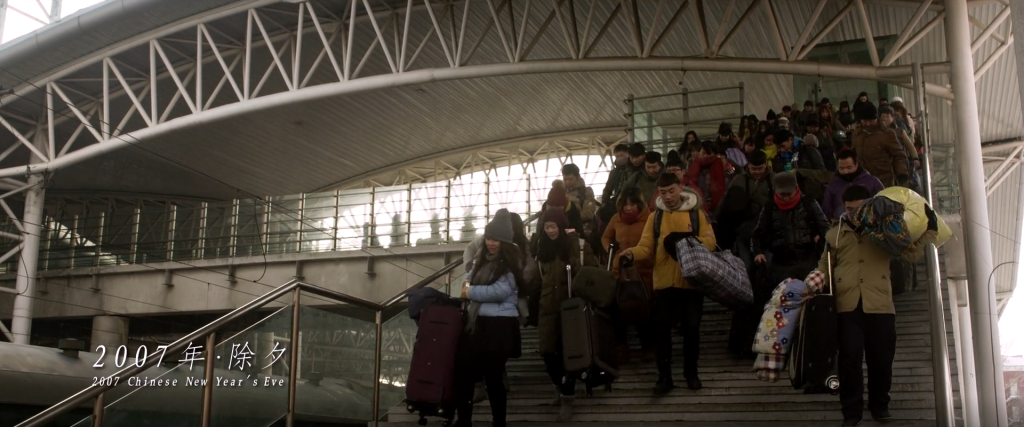
Although both characters come from the same hometown in Yaojiang, their childhood environments are crafted in a way that reflects their unique experiences and identities as internal migrants. The audience gains glimpses of Fang Xiaoxiao and Lin Jianqing’s distinctive childhoods when return home to celebrate Chinese New Year. Rene Liu uses a variety of shots, angles, lighting, and color to distinguish the homes of Xiaoxiao and Jianqing visually.
Shots and Angles to Create Home
Xiaoxiao’s experience of returning home reveals the intrusive nature of tight-knit communities. The scene opens at a high angle, extreme long shot that centers the audience in the crowded village square and shrinks Xiaoxiao in her environment (Image B). As she simultaneously speaks to her inquisitive neighbors and passes the doors of their apartment complex, the camera switches back and forth between medium-full shots and long shots that emphasize the sudden and sporadic attention given to her by her neighbors. Voices are heard asking a flurry of questions such as “Didn’t your mom come with you?” and “When will you marry and have a baby?” It isn’t until Xiaoxiao reaches the privacy of her own home that she can take a deep breath (Image C). The camera captures this intimacy through her body language: she lets out a sigh of relief and turns to fully face the camera, no longer pressed to shield herself from its intrusion. The lack of community privacy witnessed through these shots explains why Xiaoxiao is set on marrying a Beijing native who owns a property in the capital. Her desire for obtaining a Beijing Hukou is intrinsically linked to her desire for privacy and peace. For Xiaoxiao, a home is a place free of interrogation, a moment’s relief from the chaos of life. Therefore, portraying Xiaoxiao’s overwhelming childhood experience in Yaojiang through multiple long shots and angles reveals her identity as a Beijing migrant and her desire to secure a house of her own.
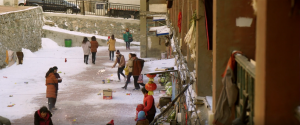
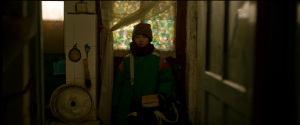
In contrast, Jianqing’s return to his quiet and tender upbringing highlights his petulance and arrogance as a young adult. Jianqing returns home to his father cooking in a warmly-lit kitchen that basks in the soft hues of the sunlight. The counter displays an array of food cooked in celebration of the Chinese New Year. In the coziness and abundance, Jianqing sneakily saunters in from the right side, initially out of frame. His introduction into the shot makes him appear like an invader in his own home because of the spontaneity of the unprompted action while his positioning closer to the camera causes him to dominate his father who is hunched over a large soup pot (Image D). Moreover, Jianqing’s complaints about the sticky buns or the lack of dish variation identify him as a self-indulgent child with no regard for his father’s efforts in cooking. This leads the audience to question the formation of his identity and desires. Throughout the film, Jianqing generally struggles not with finding a house but with recognizing the qualities that make a home. Despite being raised in a loving and nurturing environment, his father’s constant care and attention make Jianqing unaware and unappreciative. This inability to recognize his father’s efforts to raise Jianqing culminates when he asks his father, “Or what else would you do? Stay in this crappy restaurant for the rest of your life?” Ultimately, Jianqing’s growth in the film comes from learning how to appreciate the home his father created.
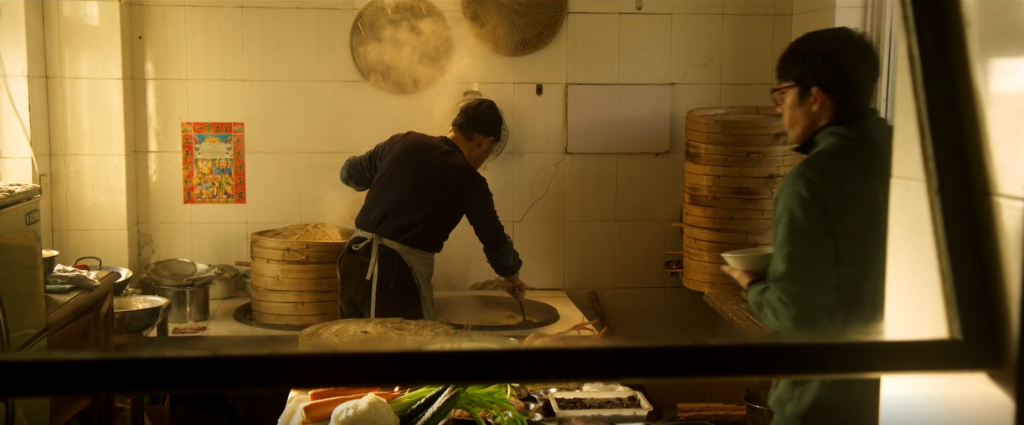
Visualizing Community in Homes
Both Jianqing and Xiaoxiao are raised in a culture that devalues personal privacy, but the way they are questioned is very different: Rene Liu captures these differences by utilizing a range of shots and color palettes. For Jianqing, life updates don’t begin until everyone sits around the dining room table. Instead of a flurry of interrogation, the elders in Jianqing’s life raise questions slowly and curiously in the inviting yellow lamplight. The voices are huddled and gathered in an intimate circle—they don’t feel like shots fired from multiple people at a single target. When the two interrogation scenes of Jianqing (Image E) and of Xiaoxiao (Image F) are directly compared, the differences in the technical elements become clear. For Jianqing, the director constructs a warm, nurturing home in which curiosity comes from a loving place. The director focuses on close-up shots at eye level and she bathes the scene in saturated browns and dimly lit yellows. A faint glow emits from the circular table and illuminates the faces of the people gathered around it. This establishes a mood of openness centered around celebration and camaraderie. Conversely, Xiaoxiao is raised in a distant, cold environment of exhaustive badgering. The lackluster gray of the apartment building and the faded, brown pillars creates monotony and dull homogeneity. Xiaoxiao’s environment seems to demand conformity. Through various filming techniques, the director sets the stage for the conflicts that each character must overcome.
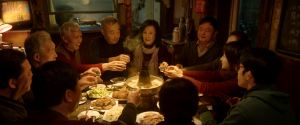
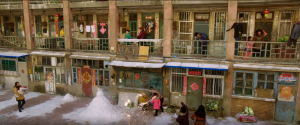
Conclusion
Us and Them explores the major themes of adolescent identity and motivation. The film illuminates the migrant struggles of Chinese youth, specifically in searching for an identity that reconciles the past experiences of one’s hometown and the present circumstances of one’s conditions. By constructing environments through cinematic elements (e.g. shots, camera angles, lighting, and color), the film makes sense of the change in the character’s internal and external worlds. Though Xiaoxiao and Jianqing do not succeed in staying together, they do succeed in creating separate homes in the city that reflect or transcend their homes in Yaojiang. Their converging stories support the importance of place in identity formation, specifically for young migrant workers. Most importantly, Us and Them gently reminds individuals that homes are created by the community and carried in one’s heart.
Bibliography
Cheng, Eiko. “A Closer Look at the World’s Largest Annual Human Migration: Chunyun.” iChongqing, 17 Feb. 2022, www.ichongqing.info/2022/02/17/a-closer-look-at-the-worlds-largest-annual-human-migration-chunyun
Crombie, Zoe. “US AND THEM: A Simple, Touching and Beautiful Movie.” Film Inquiry, 10 July 2018, www.filminquiry.com/us-and-them-2018-review.
“Liu, Rene (劉若英).” Women Filmmakers and Transnational China in the Twenty-First Century, 28 June 2021, chinesewomenfilmmakers.wordpress.com/liu-rene.
Pag-Iwayan, Jessica. ‘Us And Them’ Breaks Barriers in China the Story Spans a Decade of Love and Heartache. 25 June 2018, web.archive.org/web/20181230184113/http://entertainment.com.ph/2018/06/25/us-them-breaks-barriers-in-china.
Stein, Erica, et al. The Routledge Companion to Media and the City. Abingdon, United Kingdom, Taylor and Francis, 2022.
Us and Them. Directed by Rene Liu and produced by Zhang Yibai, performances by Jing Boran, Zhou Dongyu, and Tian Zhuangzhuang, Netflix 2018.
Yu, Richard. “Review: Chinese Blockbuster ‘Us and Them’ Will Make You Miss Your Ex.” Cinema Escapist, 12 Feb. 2020, www.cinemaescapist.com/2018/05/us-and-them-will-make-you-miss-your-ex.
Media Attributions
- Image A is licensed under a CC BY-NC-SA (Attribution NonCommercial ShareAlike) license
- Image B is licensed under a CC BY-NC (Attribution NonCommercial) license
- Image C is licensed under a CC BY-NC-SA (Attribution NonCommercial ShareAlike) license
- Image D is licensed under a CC BY-NC-SA (Attribution NonCommercial ShareAlike) license
- Image E is licensed under a CC BY-NC-SA (Attribution NonCommercial ShareAlike) license
- Image F is licensed under a CC BY-NC-SA (Attribution NonCommercial ShareAlike) license
- All images and quotes without citations are from the film itself. ↵

